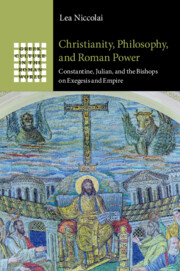 Christianity, Philosophy, and Roman Power
Christianity, Philosophy, and Roman Power from Part II - Making and Breaking Constantine: Julian Augustus
Published online by Cambridge University Press: 07 July 2023
Chapter 3 addresses the writings Julian composed during his sole rule (361–63) following Constantius’ sudden death. I suggest here that Julian’s mature output was grounded in the intuition that the challenge to Christian power had to be channelled into an attack on its identity as a superior interpretive system. The first section draws on a reading of key texts by Constantine and his supporters to contextualise Constantius’ intellectual self-image in the legacy of his father’s cultural policy. Constantine legitimised his subversive status as Christian emperor by projecting himself as the sublime exegete of divine providence. The second section illustrates the strategies Julian devised to deny the validity of Christianity’s hermeneutical claims, which he envisaged as prepared by Greek philosophical achievements and as being therefore derivative and unauthoritative. Julian’s critique was articulated through an attack on Christian exegesis (Against the Galileans) and on what Julian perceived as Christianity’s exploitative relationship with paideia (the School Ban). At the same time, Julian attempted to competitively rethink Greek allegoresis by renouncing the status of Homer as divine, enigmatic text and by composing hymns and writings constructing Greek religion as a ‘cult of culture’.
To save this book to your Kindle, first ensure [email protected] is added to your Approved Personal Document E-mail List under your Personal Document Settings on the Manage Your Content and Devices page of your Amazon account. Then enter the ‘name’ part of your Kindle email address below. Find out more about saving to your Kindle.
Note you can select to save to either the @free.kindle.com or @kindle.com variations. ‘@free.kindle.com’ emails are free but can only be saved to your device when it is connected to wi-fi. ‘@kindle.com’ emails can be delivered even when you are not connected to wi-fi, but note that service fees apply.
Find out more about the Kindle Personal Document Service.
To save content items to your account, please confirm that you agree to abide by our usage policies. If this is the first time you use this feature, you will be asked to authorise Cambridge Core to connect with your account. Find out more about saving content to Dropbox.
To save content items to your account, please confirm that you agree to abide by our usage policies. If this is the first time you use this feature, you will be asked to authorise Cambridge Core to connect with your account. Find out more about saving content to Google Drive.